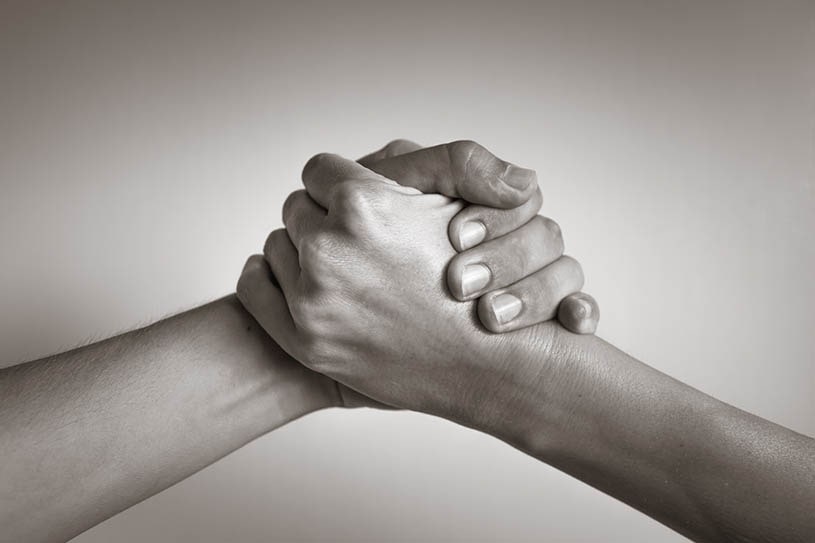
Drug and alcohol addiction affects 23.5 million Americans today, which is why some facilities have started to offer drug rehab for couples. The decision to enter rehab is a scary and overwhelming one for many, and going through it with a partner can be very comforting. Couples rehab may also provide that extra motivation to people who don’t want to be separated from their partner during treatment.
Table Of Contents:
- Signs Rehab for Couples Might be a Good Idea
- Repercussions of Shared Addiction
- Can Drug Addicted Couples Attend Treatment Programs Together?
- What is the Treatment Length at Drug Rehab Centers?
- What is the Outcome of Drug Rehab for Couples?
- When is Drug Rehab Not Recommended?
- Are there Different Rates of Recovery?
- What are some Couples Drug Rehab Facilities?
- What is the Aftermath of Drug Rehab for Couples?
- How’s a Relationship Without Addiction?
- How’s Life Without Drugs After Rehab?

In this article, drug-addicted couples who seek help for addiction can find in-depth information on how to get help as a couple. Learn more about the signs attributed to improvement or retrogression in relationship due to addiction, the significance of seeking treatment together as a couple, and important steps that can be taken on the right path to recovery and sobriety.
Signs Rehab for Couples Might Be a Good Idea
Partnerships where both individuals are struggling with addiction, are more common than one can imagine. According to data from NCBI, relapse is more certain in the female gender for couples who have partners struggling with addiction. However, it is best to address the issue as a couple from the most fundamental aspects.
Regardless of the love, passion, and commitment in a relationship where one or both partners have a drug addiction, there are bound to be issues that visibly hint at the negative effect of substance addiction in the relationship. Substance addiction impairs the ability to make logical decisions despite the “kick” that the couple may “enjoy” by using together.
The dangers of drug addiction in a family are tumultuous, ranging from behavioral to psychological. The heightened feeling experienced while using drugs as a couple can be detrimental to both health and association with each other. At this point, misdemeanors can result as well as inflicting harm on each other.
So, What are the Signs that One’s Relationship is Unhealthy and May Lead to Trouble?
- Either one or both partners neglect basic responsibilities such as childcare and home maintenance due to drug use.
- The use of drugs becomes the center of pleasure in the relationship and the only way that both individuals can enjoy each other’s company.
- Recurrence of miscommunication and domestic violence, especially during or after drug use
- Drug-addicted couples require the drug to find meaning in their relationship or show affection for one another.

Repercussions of Shared Addiction
There is a substantial amount of strain on a relationship when one person is battling the effects of addiction. When both individuals in a relationship share the same addiction, it becomes a toxic relationship because both individuals are codependent and have an enabling attitude towards the addiction of one another. It becomes near impossible to even make an attempt towards seeking help. When one exhibits a rash compulsive need for drugs, the other is likely to encourage them by “rescuing” them with the substance. The cycle of abuse is constantly reinforced by the enabling behavior of both individuals, even when harmful behaviors are exhibited. The relationship may become toxic and yet unrelenting due to the dependency on one other for the substance and emotional boost.
Shared addiction comes with severe repercussions such as viral infections like HIV/AIDs and other infections due to sharing needles and unprotected sex. In addition, shared addiction may increase the amount of drug use per session due to enabling behaviors. Finances also suffer when both individuals in a relationship spend on securing more drugs.
Can Drug Addicted Couples Attend Treatment Programs Together?
Treatment for substance abuse in couples halfway houses usually involves an extensive substance abuse regimen and relationship counseling, both of which are important in addressing the deep-seated problems leading to substance abuse. Rehabilitation options for drug-addicted couples are either outpatient or inpatient programs. An inpatient program provides a safe environment and accommodation for a family to live in while receiving intensive care and round-the-clock management for their addiction.
In contrast, an outpatient program provides the flexible option of returning every day for treatment while keeping up with one’s regular daily schedule. Admission into couple’s halfway houses often depends on various factors such as the severity of the addiction, urgency of treatment needed, and others.
Usually, therapy programs begin with the partners going through detox separately, after which they start counseling together. Some forms of inpatient couples drug rehab allow a couple to sleep in the same room, while others require separate rooms. Therapy can also occur in an outpatient setting or with one partner as an outpatient and the other as a resident.
Couples rehab comes with huge benefits. It goes beyond solving the issue of substance addiction; it further improves the quality of the relationship in every aspect.
Most Couples Drug Rehab Offer Rehabilitation for Addiction to Substances such as:

What Therapies To Expect at Couples Rehab Centers?
Most drug rehab for couples are based on Behavioral Couples Therapy. A study published in Addiction Science & Clinical Practice showed that drug abuse and marital problems could “cause a destructive cycle, in which each induces the other.” This form of therapy focuses on “restructuring the interactions of the dysfunctional couple” to promote sobriety. It includes a better understanding of what each other’s triggers are and making efforts to avoid them.
What therapies are the most effective for twosome suffering from addiction? The recommended therapy will depend on the kind of addiction involved. The key is to find a tailored treatment that will promote positive change and support sobriety.
Here are the Most Common Methods Used in Numerous Rehabs and Couples Halfway Houses:
Behavioral Couples Therapy (BCT)
The BCT program is ideal for couples drug rehab and is designed to help individuals struggling with addiction modify their lifestyle and attitude towards substance abuse. The treatment for couples is achieved through various means, one of which is the “recovery contract.” The recovery contract enforces that one must abstain from drinking or using drugs, while the role of the partner is to provide the needed support towards this goal. The meetings with a qualified therapist may hold a number of times weekly to discuss goals and to develop new coping skills for the couple.
Medication-Assisted Treatment (MAT)
The MAT addiction treatment technique is used to address critical conditions of substance abuse by using medications such as Naltrexone, buprenorphine, and methadone. These medications assist in the detoxification process and alleviate the withdrawal symptoms of drug addiction. The program also provides maintenance after the detox session ends. MAT provides drug education for spouses who do not have addictions on the best ways to help their partner through recovery.
Alcohol Behaviors Couples Therapy (ABCT)
The program is specifically for family members who are dealing with alcohol addiction. It consists of various psychotherapeutic frameworks that are geared towards healing and promoting abstinence. It is typically an outpatient program that aims to solve problems related to effective communication, contingency management, self-control, and other sobriety-related issues.
12-step Meetings, such as Recovering Couples Anonymous (RCA)
Most drug rehab for couples offers 12-step meetings as one of its support programs for drug and alcohol recovery. Couples in recovery may continue to attend these programs after completing treatment. The focus of the 12-step program is submitting to things beyond one’s control and committing to healing by getting assistance from each other through shared sobriety.
Treatment Length at Drug Rehab Centers for Couples
Treatment can continue from one to nine months, depending on a couple’s case and the chosen program. Partners can expect to attend an average of 15 outpatient sessions over a period of up to six months. Making a “recovery contract” is an important part of BCT. This is where the partners promise each other not to take drugs or drink alcohol and to support his or her sobriety. According to data from the medical journal Science & Practice Perspectives, BCT has resulted in limited substance abuse, increased levels of relationship satisfaction, and reduced instances of domestic violence. The journal also reports that couples rehab produces more effective results than individual counseling. Many studies confirm these findings.
The Outcome of Drug Rehab for Couples
Partners who have a strong relationship and are equally committed to eliminating drugs from their lives can expect excellent outcomes. The most important element of having partners in therapy together is motivation. The National Institute of Health (NIH) reports that an individual’s motivation to recover from drug abuse, whether by sanctions or enticements, is a vital element in therapy, making him or her more likely to complete treatment. This motivation is strengthened in couples rehab if they constantly reaffirm their mutual engagement with therapy and their commitment to one another.
Couples therapy has advantages for both partners, such as limiting the risk of relapse, even if only one of them is abusing drugs or alcohol.

When is Couples Drug Rehab Not Recommended?
Behavioral Couples Therapy should not be attempted in relationships with a history of domestic abuse. Moreover, codependent partners may find it challenging to seek treatment together because the more passive partner might find it difficult to speak her mind out of fear of the other person’s reaction or become more focused on her partner’s recovery than on her own. In some cases, a relapse by one partner might lead the other partner to relapse as well. It is of paramount importance that the patient is in a drug-free environment because the risk of relapse is most severe during the stabilization period.
Both people in couples rehab must be equally committed to a life without drugs. In cases where the individuals have issues that must be dealt with separately, separate living quarters may be arranged.
This includes, above all, serious medical or psychological issues. In a more comprehensive list, here are specific situations when couples drug rehab is not recommended:
- When one partner has an addiction and requires treatment
- When the relationship is steeped in domestic violence
- When the partners are at a breaking point when the relationship is no longer wanted
- When their addictions or situations differ, requiring separate methodologies of treatment
- When there is a diagnosis of a mental disorder in one or both partners
- When just one of both is seeking or committed to treatment
Different Rates of Recovery
In rehab for couples, the individuals often recover at different rates and can end up out of sync. A partner who is moving faster may begin to resent his or her significant other, or one who is recovering more slowly may start suffering from a sense of failure. In these cases, rehab experts recommend individual courses of treatment for partners setting out on the road to recovery. The situation can involve therapy and communication with them together if they are committed to making the relationship work. A regular schedule could include several joint therapy sessions a week and the option to visit one another. Otherwise, the family would remain in separate parts of the facility in the case of couples’ inpatient rehab or even separate buildings for the main components of the program.
Best Couples Drug Rehab Facilities
An individual recovery program is a prerequisite for successful addiction treatment of twosome. Drug and alcohol addiction treatment facilities that offer couples rehab must have specialized programs. The clinician who operates a couples treatment program must have extensive training in marriage counseling and sexual issues.
Below are some details about receiving treatment at two facilities offering rehab for couples:

Daylight Recovery Center
The facility offers comprehensive couples addiction treatment at a state-of-the-art facility designed for comfort, safety, relaxation, and healing. It is well equipped with amenities, a high staff-patient ratio, clinical professionals, and recreational areas. Daylight Recovery avails multiple levels of care, and these include detoxification, residential services, partial hospitalization, intensive outpatient program, aftercare services, and sober living for couples. Every critical patient is entitled to a medication protocol that ensures comfort during the critical period, and 24/7 monitoring and management are provided.

Asana Recovery Center
Asana Recovery is a renowned medical facility that provides couples addiction therapy, among others, to partners struggling with substance addiction. The facility is located in the heart of Orange County, in a tranquil environment that ensures a calm and peaceful feel. They provide multiple levels of treatment, inclusive of detoxification, residential care, outpatient, and transitional living. The facility in Orange County has a high recovery rate for couples addiction and provides 24/7 management as well as aftercare services to ensure a safe and seamless transition into their regular lives. Sober living for couples is especially very useful for couples in recovery.
The Aftermath of Drug Rehab for Couples
Drug abuse affects relationships in ways that make it hard to go back to the way things were before it started. The risk of relapse is always there even after undergoing rehab, and some emotional injuries cannot be taken back. In addition, the partners might have developed relationship habits that need to be reversed, such as facilitating substance use or becoming codependent on the other person’s substance abuse. If this isn’t achieved, it will be less likely for the partners to recover. This is why one of the main goals of joint therapy in rehab is to help people develop a new relationship standard, including new ways of communicating and spending time together doing new things that support abstinence. These new behaviors take time to learn, but they can improve a relationship and give the partners ways to maintain a strong bond by supporting each other to maintain sobriety.
A Relationship without Addiction
Alcohol and drug addiction can cause relationships to spiral into depths that neither partner could have imagined were possible. Sometimes people with substance use disorder recognize the visible manifestations of the way dependence has taken a toll on their lives, and these are supplemented by the ever-lingering realization that the desire for drugs is killing them on the inside too.
After the initial high is gone, a person feels physically deteriorated and emotionally and mentally drained. Despite the almost insurmountable urge, one always feels the need for change, and the little voice telling them they need professional help cannot be silenced. It is never too late to climb out of the abyss the relationship has fallen in. What people in this situation most often ask themselves is: Will my partner support me? This is where sober living for couples plays a significant role.
Life Without Drugs
There’s no denying the complexity of addiction. A large number of factors contribute to the drive to abuse a drug or to drink too much. Understanding one’s thoughts about the rehab process is a key to successful addiction treatment and recovery. What stops most people from pursuing this option is the doubt in their ability to overcome addiction and being unable to imagine life without one’s substance of choice. After the detox stage, people find they have a lot of free time on their hands. The sheer boredom of this can be crushing. Having a supportive partner can go a long way toward coping in this stage of recovery. If both partners are suffering from addiction, they need to motivate each other to do things that promote sobriety in this period of time instead of dwelling on the negative aspects of the situation. The strength and love partners can offer one another in the process of recovery can be essential. This is a source of motivation, which helps couples in recovery to recover fully and enjoy life without drugs.
Starting a new life as a couple after rehab should include major changes to lifestyle and exercising new virtues such as patience and tolerance in order to build positive connections with one another.
Here are a Few Ways to Be Better Partners to One Another After Twosome Rehabilitation:
- Be more flexible and tolerant of your partner’s choices and decisions
- Find yourself, figure out what motivates and inspires you and then stay true to yourself
- Be supportive, show commitment to working closely with your partner during recovery
- Be present, show up when needed to support or play a significant role in the life of your partner
- Be compassionate towards the needs of your partner. Be kind and attentive to them, especially in difficult times
- Practice self-control and self-care
Hope Without Commitment
Find the best treatment options. Call our free and confidential helpline
Most private insurances accepted
Find Drug Rehabilitation Centers Near You Anywhere In the US
Addiction Resource team has compiled an extensive list of the top drug rehabilitation facilities around the country. Use our locator tool to find the best centers near you.
Page Sources
- Fals-Stewart, W., O’Farrell, T. J., & Birchler, G. R. (2004). Behavioral couples therapy for substance abuse: Rationale, methods, and findings. Science & Practice Perspectives, 2(2), 30. https://www.ncbi.nlm.nih.gov/pmc/articles/PMC2851021/
- National Center of Biotechnology Information https://www.ncbi.nlm.nih.gov/pmc/journals/1211/
- Darrodi, H., Younesi, S. J., Bahrami, F., & Bahari, F. (2010). Hope–Oriented Mental Rehabilitation and enhancement of marital satisfaction among couples with addicted husband. Iranian Rehabilitation Journal, 8(1), 43-49. http://irj.uswr.ac.ir/browse.php?a_id=94&sid=1.&slc_lang=en
- Klostermann, K., Papagni, E., Borrelli, D., Mahadeo, M., & Mignone, T. (2019). Substance Abuse and Partner Violence: The Case for Couples Therapy. Global Journal of Addiction & Rehabilitation Medicine, 6(4), 49-51. https://ideas.repec.org/a/adp/jgjarm/v6y2019i4p49-51.html
- Greenfield, S. F., Back, S. E., Lawson, K., & Brady, K. T. (2010). Substance abuse in women. Psychiatric Clinics, 33(2), 339-355. https://www.ncbi.nlm.nih.gov/pmc/articles/PMC3124962/
- NIDA. 2020, July 30. Drug Use and Viral Infections (HIV, Hepatitis) DrugFacts. Retrieved from https://www.drugabuse.gov/publications/drugfacts/drug-use-viral-infections-hiv-hepatitis
- NIDA. 2020, September 18. Principles of Effective Treatment. Retrieved from https://www.drugabuse.gov/publications/principles-drug-addiction-treatment-research-based-guide-third-edition/principles-effective-treatment


 Reviewed by:
Reviewed by:  Written by:
Written by: 











 FindTreatment.gov
FindTreatment.gov